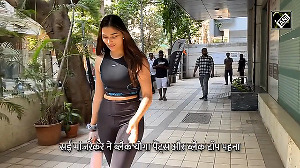Tata Motors inked an investment agreement in February to acquire the South Korean truck-major Daewoo Commercial Vehicle for $102 million.
The acquisition marks the beginning of Tata Motors global expansion trail and is expected to help the company make a headway in a number of other markets.
Ravi Kant, executive director of commercial vehicles business at Tata Motors, spoke to Arijit De and Parvathy Ullatil on the road ahead.
What does the Daewoo Commercial Vehicle acquisition mean to Tata Motors?
The most important advantage is that our top line and bottom line will go up. International business accounted for less than Rs 400 crore (Rs 4 billion) of our total turnover last fiscal. The Korean company itself recorded a turnover of Rs 1200 crore (Rs 12 billion) in the previous fiscal and is a profit-making company.
What else does the acquisition signify?
Commercial vehicle is a cyclical business. The larger the market share of a company the more severe is the cyclical impact, also the more liberal the markets, the more pronounced is the cyclical impact.
The only saving grace in this business is the cyclical phase lag across different geographies. Spreading our business to different countries will act as a hedge against cyclical trends because when the domestic CV business is in a slump, things will be looking up elsewhere.
What are your plans for your new Korean subsidiary?
Daewoo is present only in the heavy commercial vehicle (HCV) segment, though the Korean plant can produce both medium and light commercial vehicles.
The capacity utilisation was only 25 per cent last year. We would like to improve Daewoo's market share in the HCV segment from 25 per cent and increase it by another 5-7 per cent. We will also enter the larger medium truck segment which is dominated by one group, we will enable Daewoo's entry into this segment at a faster pace, in 12-18 months and in the most economical manner. Then we will like to take the product and go outside Korea.
Which markets will you target through Daewoo?
There is a tremendous amount of synergy between our product portfolio and Daewoo's. We can now go to the international markets with a range of products to cater to every segment. We will use Daewoo as a manufacturing hub for exports to India, South Africa, Russia, China and Latin America.
What kind of capacity utilisation are you looking to achieve in the first year?
Daewoo Commercial Vehicle is still not entirely in our fold yet. It will take us another five-six weeks to get our share. So we will not be in position to comment on any specific plans for another six-eight months.
What happens to your 'truck of the future' project following the Daewoo acquisition?
We will rope in Daewoo to work with us on the 'global truck' platform. They are very strong in the integration of vehicles so we will combine our competencies, manpower and other resources.
Daewoo too has been working on a similar project independently. We believe that working with Daewoo will help us hasten the progress on the new platform. The 'truck of the future' should be ready to roll into international markets by 2007.
What is Tata Motors' strategy for meeting its export targets?
We have set a goal where overseas revenues will account for 25 per cent of our turnover in three years. We have identified four key markets, India, China, Latin America and Western Europe, which are at different stages of growth and maturity. With our current competencies, including the Daewoo CV, we are equipped to enter the stage I and II markets.





